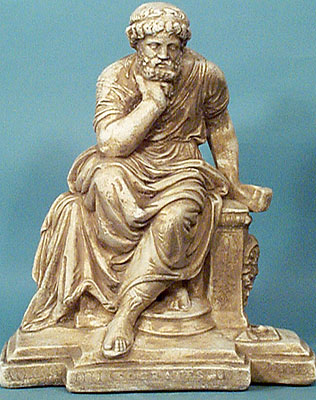Socrates

В
статье рассказывается о философии Сократа
Socrates
occupies a foundational place in the world history. However in spite of this
fact, he left no notes after him (Socrates). His ideas became known only due to
the notes of his students. Among these works Plato’s "The Apology” occupies an
outstanding place. It he whom we are obliged for almost everything we know
about Socrates today.
Socrates
spoke of God this way: he did not know whether he existed or not, but knew that
his thoughts were all over around them. Soul and consciousness are primary for
him, nature is secondary. He considered that if a person knew his own soul, it
would help to know God and to approach him. Human reasonabless is the major
proof of God’s existence.
Socrates was
a man of a great wisdom. He did not try to persuade people in his own point of
view or vision of the world. He asked many questions and thus let people
express their own thoughts and philosophy on this or that topic. Socrates’
attention was mainly fixed on people. A man was in the centre of his interests.
He tried of understand people’s philosophy, their essence and soul. Therefore
his philosophy is known as ethical philosophy. His simple questions puzzled and
bewildered protagonists of demagogy. Aristocrats considered him a man of the
common people, democrats were afraid that he would uncover their evil and
unfair essence. It took a long time for people to endure all his bold
questions, commentaries and statements. However, at last the authorities could
stand it no longer and Socrates was the first man to be sentenced to death.
Socrates
told that the main object of wisdom is to differentiate between good and evil.
There are no sinless people, that is why it is very important to see our own
and other people’s sins and vices. One of the most low and ugly vices Socrates considered
drinking. He considered that mind dominates in other vices. There are vices
which imply virtue, knowledge, diligence, courage, perspicacity,
resourcefulness, slyness and craftiness. But drinking is the worst of them
because it destroys body and mind while the others only dull them. This vice is
corporeal and material. Therefore the rudest people are those who are prone to
drinking. As to the virtues, Socrates differentiated four kinds of them:
prudence or wisdom, courage, temperance or self-discipline and justice or
morality (Socrates In Plato`S The Republic). These were Socrates’ ideas as to
goodness and evil.
"Scio me
nihil scire”: "As for me, all I know is that I know nothing.” (Socrates
quotes). These Socrates’ words are the essence of human wisdom. The great Greek
philosopher sincerely admitted that he knew nothing in this world. Was it
really so? I really doubt this fact. If this great man really knew nothing he
would not be considered by millions of people of all times in the course of
history one of the cleverest and wisest men of all times. So, the essence of
this expression is deeper that it may seem from the first sight. The idea of
these magnificent words is not that a person should know much in this world,
but to understand that no one can know everything and to claim this would not
even unwise but really foolish. His own example showed that the more a person
knows in this world, the more he or she comprehends that the sphere of
knowledge is boundless and it is impossible even to approach it. Unfortunately
not many people in our modern world are aware of real essence of Socrates’
words. People are too selfish and arrogant to remember they cannot understand
and know everything. Therefore on the basis of their ignorance, prejudice and
misconception they ignore other people’s interests and attack them. This is
definitely misinterpretation of Socrates’ words. We should really think about
it and change our behavior. These words should lead to another very important
thought about self-knowledge: "nosce te ipsum”. This is the only way for each
person to come to the understanding and comprehending of justice, law,
goodness, virtue, and evil. The foolishness is not in knowing little, but in
not knowing yourself and thus thinking that you are not clever.
Socrates
considered that philosophy is the only way to know God. He believed that
philosophy is a kind of death. A person prepares to die on earth, but the soul becomes
free from its body cover and gets its own existence. That is why Socrates was
not afraid of death. A person is not a simple part of nature. Existence is
originally given to a person. It is not in our power to be born or to be not,
we can only grasp the idea that "scio ne nihil scire”. A person can understand
on his own that all of us are the part of one common commencement; we belong to
something common, to what all people are referred to.
|  Главная
Главная  Наши работы
Наши работы Мой профиль
Мой профиль Регистрация
Регистрация Выход
Выход Вход
Вход